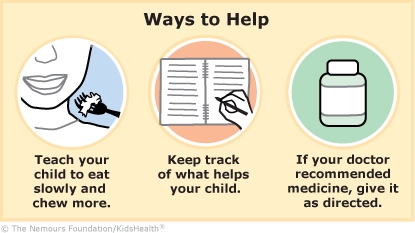Gas is air that comes out of the body, either by passing through the mouth (burping) or through the bottom (farting). Everyone has some gas — that is normal. But if kids have a lot of gas or it doesn't pass out of the body as usual, it can cause belly pain and bloating (fullness or swelling).
Gas pains usually get better with changes in the diet and eating habits. If needed, there are medicines that can help too.

Follow your health care provider's advice for:
- Giving your child any medicines
- Any foods your child should avoid
- When to follow up
To help your child feel more comfortable while the gas passes and to prevent gas in the future:
- Offer small, more frequent meals instead of fewer large meals. Remind your child to eat slowly and chew food thoroughly.
- Avoid or limit foods and drinks that can cause gas, such as:
- Broccoli, cauliflower, cabbage, Brussels sprouts, asparagus, beans, apples, pears, peaches, prunes, whole grains, juices, milk, yogurt, cheese, sugar-free candy, and sodas and other carbonated drinks
- Try foods that are less likely to cause gas, such as:
- Lean meats, fish, eggs, avocado, cantaloupe, zucchini, rice, and dairy substitutes (like almond or soy milk)
Other tips:
- Have your child keep a record of what foods and drinks make their gas better or worse. This can help them avoid things that make the gas worse.
- Encourage your to child stay active to help move the gas through their body.

What causes gas pain? Too much gas can happen from:
- Swallowing too much air, often while eating, drinking, or chewing gum
- Eating or drinking certain foods or carbonated drinks
- Problems with digesting some foods (for example wheat or dairy products)
- A health condition that makes it harder for gas to pass from the body




